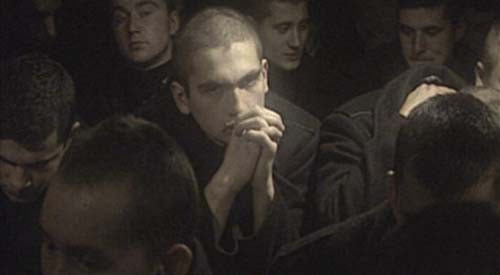The Military Series. Aleksandr Sokurov in the MACBA Collection
09 Feb - 20 May 2012
THE MILITARY SERIES. ALEKSANDR SOKUROV IN THE MACBA COLLECTION
9 February - 20 May, 2012
The work of Aleksandr Sokurov (1951, Siberia) could be defined as an exploration of the crossroads between two different filmic traditions: documentary and fiction, with the term ‘fiction' understood as the pursuit of an artistic transformation of reality. Sokurov's methodology could be characterised as a new approximation of filmic ‘traditionalism' in which the nature of personal experience takes a central role within that approach.
Sokurov's oeuvre is varied, including features, documentaries, videos, and programmes for TV and radio. All of these share a thread: the search for human nature, its hidden meanings and the definition of the ontological characteristics of every protagonist in order to represent the experience of a whole generation, age or, even, a whole civilisation. A body of work in which representations of landscapes play an important part and where reality is transformed into an abstract composition and an artistic metaphor. An idea that can be extrapolated to the documentary material that Sokurov uses not as an illustration or interpretation of a concept or an idea, but instead as the revelation of an emotional state. A body of work in which different levels of interpretation co-exist and which could be defined as one of the most complex and interesting in contemporary film making.
The exhibition at the MACBA presents for the first time, the simultaneous projection of all the pieces in the museum's collection: Spiritual voices (1995), Confession (1998) and The soldier's dream (1995). These films, conceived as a single travel diary, deal with one of the artist's recurring themes: military life on the frontline as a metaphor for the human condition. A representation of experiences marked by war in which temporal limits cease to exist. Shot on the border between Tajikistan and Afghanistan, Sokurov shares private moments with the soldiers taking us closer to a reality marked by the war and its effects; a series of films in which music plays a central role, accompanying us through cinematic poems, which don't only need to be seen, but also listened to.
This exhibition is presented as part of a collaborative project with the CCCB within the context of the exhibition Global screen and will be complemented with a season dedicated to the feature films of Aleksandr Sokurov at the Filmoteca de Catalunya. It is also important to point out that this constitutes an opportunity to reflect on the role of cinema within a museum context helping us to explore the limits, both conceptually and in terms of artistic representation: a line of study that began in shows like The Otolith Group. Ways of thinking or 1395 Days without Red by Sejla Kameric and Anri Sala, still in exhibition, in which the relationship between the films and documentaries, the possibilities of sound and the limits between cinema and artistic production take a central role.
9 February - 20 May, 2012
The work of Aleksandr Sokurov (1951, Siberia) could be defined as an exploration of the crossroads between two different filmic traditions: documentary and fiction, with the term ‘fiction' understood as the pursuit of an artistic transformation of reality. Sokurov's methodology could be characterised as a new approximation of filmic ‘traditionalism' in which the nature of personal experience takes a central role within that approach.
Sokurov's oeuvre is varied, including features, documentaries, videos, and programmes for TV and radio. All of these share a thread: the search for human nature, its hidden meanings and the definition of the ontological characteristics of every protagonist in order to represent the experience of a whole generation, age or, even, a whole civilisation. A body of work in which representations of landscapes play an important part and where reality is transformed into an abstract composition and an artistic metaphor. An idea that can be extrapolated to the documentary material that Sokurov uses not as an illustration or interpretation of a concept or an idea, but instead as the revelation of an emotional state. A body of work in which different levels of interpretation co-exist and which could be defined as one of the most complex and interesting in contemporary film making.
The exhibition at the MACBA presents for the first time, the simultaneous projection of all the pieces in the museum's collection: Spiritual voices (1995), Confession (1998) and The soldier's dream (1995). These films, conceived as a single travel diary, deal with one of the artist's recurring themes: military life on the frontline as a metaphor for the human condition. A representation of experiences marked by war in which temporal limits cease to exist. Shot on the border between Tajikistan and Afghanistan, Sokurov shares private moments with the soldiers taking us closer to a reality marked by the war and its effects; a series of films in which music plays a central role, accompanying us through cinematic poems, which don't only need to be seen, but also listened to.
This exhibition is presented as part of a collaborative project with the CCCB within the context of the exhibition Global screen and will be complemented with a season dedicated to the feature films of Aleksandr Sokurov at the Filmoteca de Catalunya. It is also important to point out that this constitutes an opportunity to reflect on the role of cinema within a museum context helping us to explore the limits, both conceptually and in terms of artistic representation: a line of study that began in shows like The Otolith Group. Ways of thinking or 1395 Days without Red by Sejla Kameric and Anri Sala, still in exhibition, in which the relationship between the films and documentaries, the possibilities of sound and the limits between cinema and artistic production take a central role.

